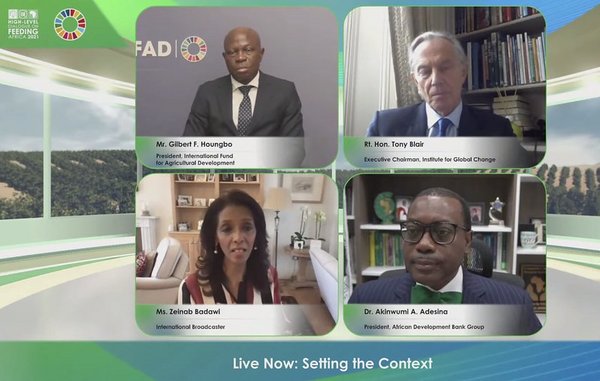- Share this article
- Subscribe to our newsletter
Boosting agricultural production in Africa
17 African heads of state at the High Level Dialogue on Feeding Africa 2021 on 29 and 30 April 2021 signed on to the commitment to boost agricultural production by doubling current productivity. Moreover, a coalition of multilateral development banks and development partners pledged over USD 17 billion to increase food security on the African continent. The event was hosted by the Africa Development Bank and the UN International Fund for Agricultural Development (IFAD), in partnership with the Forum for Agricultural Research in Africa (FARA) and the CGIAR System Organization.
The virtual two-day high-level dialogue brought together government officials, heads of multilateral development banks, development partners, regional organisations, research institutions, business leaders, private sector operators, investment agencies, participants from academia, civil society organisations and experts from across Africa and beyond. It focused on modernising food production, making African agriculture more business oriented, and strengthening agriculture value chains.
Low productivity of staple crops makes African agriculture uncompetitive
Sub-Saharan Africa has a quarter of the world’s arable land but only produces 10 per cent of its agricultural output. The low productivity of staple crops makes African agriculture uncompetitive. As a result, the continent imports one-third of the calories consumed. This makes food systems more vulnerable and dependent on external food supply chains.
At the event, African heads of state committed to focus on the following points to boost agriculture:
- Accelerate agricultural production by taking technologies to scale.
- Increase investment in research and development.
- Optimise technology.
- Improve business language in agriculture to open up to the world.
- Support access to markets and the installation of basic infrastructure and equipment.
- Invest in new businesses to transform agricultural produce to support small producers.
- Create a facility for agricultural transformation.
The forum communiqué reflected these action points, emphasising the call for a financing facility for food security in Africa. It was agreed that this would be an appropriate channel for scaling-up climate resilience and successful agricultural technologies. It would include digital innovations to farmers across Africa and would allow countries to better address malnutrition and child stunting.
USD 17 billion to increase food security on the African continent
Of the overall amount of USD 17 million pledged, more than USD 10 billion came from the African Development Bank, which said it would invest USD 1.57 billion on scaling up 10 selected priority commodities over the next five years. This will help countries achieve self-sufficiency. Another USD 8.83 billion go towards building strong value chains for these commodities over the next five years. This will include programmes to create opportunities for young people – particularly women.
IFAD said it aimed to provide an additional USD 1.5 billion to Africa to support national efforts to transform food and agricultural systems over the next three years. IFAD will also invest more in creating the pre-conditions for increased agricultural productivity. The organisation is helping to develop a growing pipeline of investments to restore land, create jobs and build resilience to climate change in the Sahel region. This will contribute to the Great Green Wall objectives, and aims to create 10 million jobs in the region by 2030.
The Arab Bank for Economic Development in Africa (BADEA) committed up to USD 1.5 billion over the period 2020-2024 in agriculture. The Islamic Development Bank Group said it would earmark USD 3.5 billion in developing the agriculture sector in Africa in the next three years. It stated that these investments will develop commodity value chains for both staple food and cash crops.
The Bill & Melinda Gates Foundation, joining a coalition of development partners in 2019, declared that it would invest USD 310 million over the next three years. This will support agriculture research and development initiatives in Africa. This funding is expected to empower 300 million farmers with a host of new innovations.
The outcomes from this week’s Leaders’ Dialogue will be communicated to the UN Secretary General as Africa’s commitments towards the UN Food Systems Summit in September this year. They will lay the foundation for Africa to present a unified voice to step up efforts and partnerships towards reaching the Sustainable Development Goals by 2030.
(AFDB/ile)
Read more at AFDB website





Add a comment
Be the First to Comment